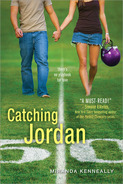
Though the descriptions of football practices and games are realistic and well-researched, I found myself believing Jordan as a character more when she compared things normally unrelated to the sport to “football, dominator of fall – football, love of my life” (1). In Jordan's world, her friends don't make out, they kiss “as if winning the state championship depends on it” (6). The grass isn't just green, it's like “lying on Astroturf, only without the rug burns” (128). Instead of saying “after dinner,” Jordan says “before Monday Night Football” (187). Speaking “football” shows how close to her heart Jordan holds her beloved sport and quarterback abilities; football is always on her mind.
The comparisons extend beyond descriptions of events and setting to express Jordan's deepest emotions. Her emptiness is “a playbook without plays” (173). When she is angry at her father, really, really angry, she tells us, “And though it's sacrilege, I'm considering smashing his Joe Montana autographed picture” (167). Describing awe, she writes in her journal, “I thought I'd died and gone to the Super Bowl (as starting QB)” (38). Some of these comparisons may sound cheesy out of context or even in context, but the sincerity with which they are used only further drives the message home. Jordan loves all things football, even her best friend and long-time teammate Sam Henry's Cracker Jacks football charm prize that he wears religiously on a chain around his neck.
Other characters besides Jordan also speak “football.” When Jordan and Henry (Sam Henry goes by his last name) pair up for a class project to take care of an electronic baby, Jordan worries what they will do with the doll during practice. Henry says, “That's what grandparents and the junior varsity players are for” (105). JJ, another teammate, comments “Should I leave you two alone so you can make out with a football?” (189). Dialog examples such as these two bring credibility to the other members of Jordan's championship team.
In the case of cheerleaders Carrie and Marie, football knowledge expressed through comments such as “I loved your flea-flicker play the other night” (204) opens Jordan up to trust the two as friends and confidantes even though she previously referred to cheerleaders as “idiotic” (3). We know Jordan likes Carrie when Carrie says “Now go get 'em,” (122) and Jordan notes that Carrie sounds “just like Coach when he gives us pep talks before games” (122) and is “surprised she doesn't slap my ass too” (122).
The first time Jordan meets her new team mate, gorgeous Ty Green, she's taken aback by his seeming lack of dedication to the sport. “A Texas football player who doesn't kneel down and pray to the Cowboys every Sunday?” (21). Ty turns out to be not only handsome but a talented quarterback, Jordan's equal on the field. Even as Jordan determines that she cannot date a teammate and remain focused on her dreams of playing college ball for Alabama, it doesn't take long for her to become smitten, “wanting to tackle Ty in the guys' locker room” (32). She attempts to hide her feelings, later saying “I drew a bunch of Xs and Os, which aren't hugs and kisses, but offensive plays from the team playbook” (37), but hiding in a potting shed with her journal, she isn't fooling even herself.
When Jordan injures her knee during the state championship game near the end of the book, we feel her pain intensely because we know how much football means to her. And of course, her thoughts center on “My ACL? Oh God...my future...” (249). When Henry accompanies her to the ER but her boyfriend Ty stops for flowers, Jordan realizes that “maybe my life needs some physical therapy too” (254). Later, upon hearing that her knee injury is just a sprain, she writes in her journal, “I feel like I've been given a free play” (256).
Kenneally masterfully twists this language of sports metaphors when she has Jordan try to discuss her feelings with Henry using a sports (albeit baseball) analogy, only to be told by Henry that he doesn't “speak Shitty Sports Metaphor Language” (162). Henry thus forces Jordan to confront her feelings for him directly, making the moment more powerful.
As with all writing tools, simile and metaphor may be overdone, but for sports novels I feel the grass is greener on the Astroturf side. Kenneally's use of sports simile and metaphor challenged me to think about how I could use comparisons from the world of figure skating in my own novel and I also saw applications for other hobbies that are important parts of characters' lives. Writing about a piano student? Metaphors may be key. An artist? Brush up your novel with similes. Until then, “I'm taking the ball and running with it” (256).
Works Cited:
Kenneally, Miranda. Catching Jordan. Naperville, IL: Sourcebooks Fire, 2011.

 RSS Feed
RSS Feed